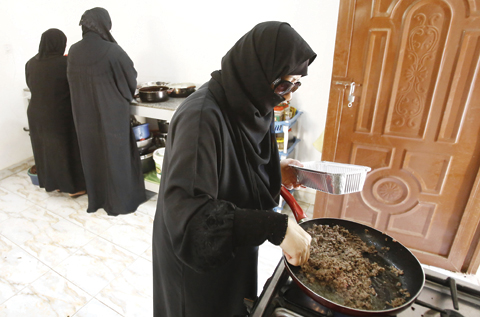 KHARTOUM: Syrian women cook at the Eve Kitchen (Hawa in Arabic) on Nov 25, 2015 as part of a project to support Syrians who have taken refuge in the Sudanese capital since 2011. —AFP
KHARTOUM: Syrian women cook at the Eve Kitchen (Hawa in Arabic) on Nov 25, 2015 as part of a project to support Syrians who have taken refuge in the Sudanese capital since 2011. —AFP
KHARTOUM: Among the simmering pots and sizzling grills of a Khartoum kitchen, Umm Mohammed has escaped from the thunderous shelling that forced her to flee Aleppo, joining a growing number of Syrians finding an unlikely shelter in Sudan. The 50-year-old now cooks Middle Eastern dishes in the Hawa Kitchen in Khartoum along with 24 others on a project to support Syrians who have arrived since 2011. While many Syrians fleeing the conflict still aim for Europe or neighbouring Turkey, a shared language and similarities in culture has made Sudan an alternative for some, the United Nations says.
With an ailing economy and millions displaced by civil war, Sudan is an improbable first choice, but Umm Mohammed - not her real name - remembers the day last year she decided to escape her Aleppo neighborhood at all costs. "In the morning we heard the sound of shelling and my son, a young man of 25, was sleeping on his bed when a shell hit," she said quietly. The blast smashed nearby windows, sending shards of glass flying and cutting him badly. "He almost died," she said quietly.
She planned to join hundreds of thousands of refugees in Jordan, but one of her adult sons who had travelled to Sudan for work told her Syrians didn't need visas to enter. She immediately booked tickets for Khartoum with her four other sons and soon after started working in the kitchen. In the quiet courtyard where she works preparing traditional Syrian stuffed vine leaves, syrupy sweets and chicken with flavoured rice, she has found safety. "People here are very good," she said, smiling.
The Sudanese have not just been welcoming to the arrivals, she said, but have taken to the business. Many of the 35-50 meals they sell daily are bought by Sudanese customers now instead of the homesick Syrians who bought the dishes initially. The women hope to expand the kitchen, possibly to include a restaurant, as more Syrians arrive.
'Opportunity to Escape'
The kitchen was launched last November by the Committee to Support Syrian Families, one of several groups run by Khartoum's Syrian diaspora to help the 40,000 to 45,000 the government estimates have arrived since 2011. Its head, Mazin Samih, a lightly bearded businessman in his 40s, arrived from Damascus in 2002 to run a food produce company and admits sanctions-hit Sudan is an unlikely shelter. "If anyone who has been hit with barrel bombs and shelled with rockets and artillery finds an opportunity to escape, whatever the opportunity, they will escape," he said.
Established in 2012, his committee registers families, asking they find work but giving them the extra financial or food support they need to make ends meet. Many of those who have come to Sudan did so because they knew members of the diaspora, but this number has increased drastically with the deteriorating situation in Syria. "The work started with 20 Syrian families in 2012 and the number of Syrians settled in Sudan has increased so that today we have more than 500," he said.
Those fleeing war have opted for Sudan instead of Europe because of language and culture, UNHCR Sudan deputy head Angela Li Rosi said. "Their preference is to be in a country where there are similarities and the language they speak is the same," she said. The government doesn't consider Syrians as refugees but allows them access to state healthcare and education. Nonetheless some 1,400 have registered with the UN for help. The UN says it expects a steady number to arrive, putting the diaspora under greater strain to care for the most vulnerable.
'I Would Go Back'
Hawa Kitchen provides livelihoods for such families, Samih said, with the women receiving a monthly wage of about 1,500 Sudanese pounds ($246), with profits going to help other families. The kitchen's administrator, Nuseiba Ayoubi, a 43-year-old native of Damascus, came to Khartoum two years ago after her son-in-law moved to Sudan for work. She was glad to escape the tense atmosphere and worsening financial situation in Damascus but was worried about Sudan after seeing news reports about the country. "They give you the image of Sudan as a country in conflict," she said.
She said that it took her some time to settle in, but found the Sudanese kind and helpful. However, with high unemployment and living costs in Sudan she struggled financially to start with, and is proud of her work helping other women at the kitchen. "We don't just give them a fish. We teach them how to fish," she said. Umm Mohammed is grateful for the work and happy have found safety. But she still dreams of home. "If the situation returned to normal, I would go back to Syria. It is our homeland." - AFP




